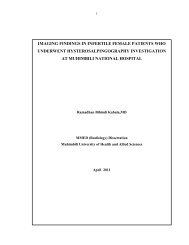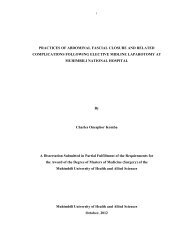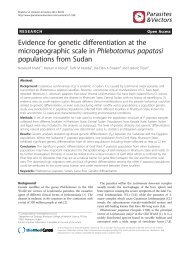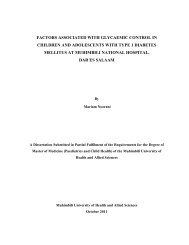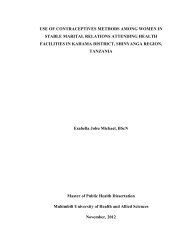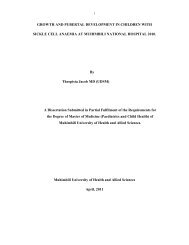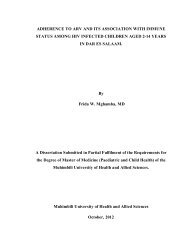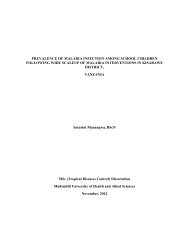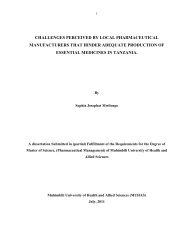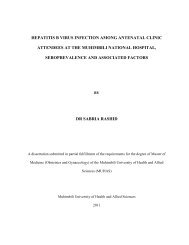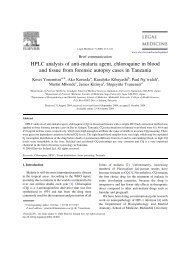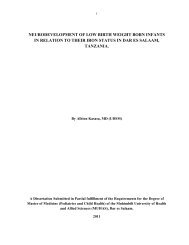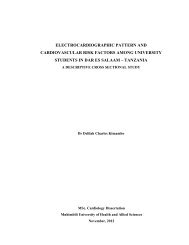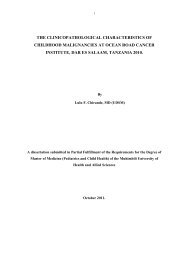DISSERTATION WORK MSAFIRI KABULWA.pdf
DISSERTATION WORK MSAFIRI KABULWA.pdf
DISSERTATION WORK MSAFIRI KABULWA.pdf
Create successful ePaper yourself
Turn your PDF publications into a flip-book with our unique Google optimized e-Paper software.
43<br />
heart diseases and lung cancer were (85.8%, 94.4%); (92.3%, 98.2%) and (94%, 91%)<br />
respectively. However the proportion of adolescents in Denmark (Jensen and Overgaard (1993)<br />
who were knowledgeable on lung and heart diseases was lower (46.3% and 49.3%<br />
respectively).<br />
About three quarters of respondents in the current study (70.6% - 71.2%) were respectively on<br />
the relationship between tobacco use and the occurrence of oral cancer. This indicates that<br />
majority of respondents in the present study had adequate level of knowledge that dipping<br />
tobacco snuff, chewing tobacco and smoking cigarettes causes oral cancer. The findings of the<br />
current study are similar to those reported by researchers in Great Britain (Terrades et al 2009,<br />
West et al 2006), India (Elango et al 2009), Australia (Rikard-Bell et 2003), and Kuwait (Al –<br />
Shammari et al 2006), where the proportion of respondents who were knowledgeable on the<br />
adverse relationship between smoking and occurrence of oral cancer varied from 62.6% to<br />
85.5%. The results of the present study are different from that reported in Sri Lanka and<br />
Nigeria where 47% and 11% of respondents respectively knew that cigarette smoking causes<br />
oral cancer (Ariyawardana and Vithanaarachchi 2005, Nwhator et al 2010). The proportion of<br />
respondents in India and Sri Lanka who were knowledgeable on relationship between pan and<br />
betel chewing and occurrence of oral cancer were 79% and 80.1% respectively (Elango et al<br />
2009, Ariyawardana and Vithanaarachchi 2005).<br />
A good proportion of respondents in the present study (67.0%- 71.6%) were respectively fully<br />
knowledgeable on relationship between dipping tobacco snuff, chewing tobacco and smoking<br />
cigarettes on the occurrence of periodontal diseases. This indicated that a greater part of<br />
secondary school students were knowledgeable on tobacco use as a cause of periodontal<br />
diseases. The findings of the present study are similar to those reported in United Kingdom and<br />
Kuwait where the proportion of adult periodontal patients knowledgeable were 80.4% and<br />
76.2% respectively (Terrades et al 2009, Al-Shammari et al 2006). The proportion of students<br />
reported to be knowledgeable in the present study is much higher than those reported by<br />
Nwhator et al (2010), in Nigeria (2.2%) and by Lung et al (2005) in United Kingdom (6%).



